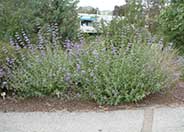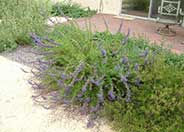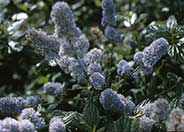
Common name:Purple or Gray Sage
Botanical name:Salvia leucophylla
The Purple Sage is an evergreen shrub that grows 2'-3' tall and 5'-6' wide. It has white stems and leaves and light purple flowers that bloom between May and June. This shrub tolerates heat and drought. The Purple Sage is a California native.

Common name:Western Redbud
Botanical name:Cercis occidentalis
This deciduous shrub ranges from 6'-20' tall and 10'-15' wide. It is desirable for its magenta spring flowers, yellow to red fall color, and dangling winter seed pods. It is tolerant of many soil types, drought and oak root fungus. It attracts hummingbirds and butterflies. The Western Redbud can be found statewide in CA in the foothills below 4500' elevations in chaparral and woodland communities.
- Cornflower Farms

Common name:Woolly Blue Curls
Botanical name:Trichostema lanatum
The Woolly Blue Curls is an evergreen shrub that reaches 3'-5' high. It has an open branching habit and has long stalks of brilliant purple woolly flowers in the spring and summer. This shrub is native to California, is drought tolerant, and attracts hummingbirds. -Cornflower Farms

Common name:Carmel Creeper
Botanical name:Ceanothus griseus horizontalis
Carmel Creeper is one of the most popular forms of spreading shrubs. Its glossy oval leaves of 2" are bright green. The tiny, light blue flowers are abundant and form 1" clusters. This shrub benefits from pruning. It does best in well-drained soil with little to no summer water.

Common name:Coast Live Oak
Botanical name:Quercus agrifolia
The Coast Live Oak is an evergreen round headed tree. It can reach 40' high and 20' wide; it grows very well from the coastal areas to the interior valleys. It is native to California, is drought tolerant, and attracts butterflies.
Designer: Bob Perry and Associates
Photographer: GardenSoft
Practice grass-cycling by leaving short grass clippings on lawns after mowing, so that nutrients and organic matter are returned to the soil.
Attract, or buy beneficial insects such as ladybugs and lacewings to control pest outbreaks in your garden.